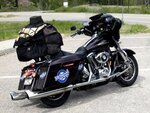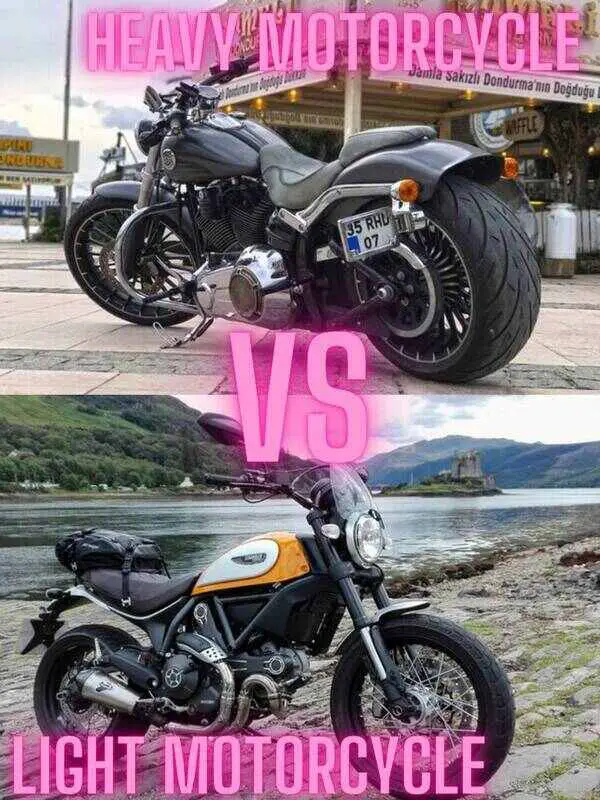When you chose your motorcycle, many people might have told you to check out the weight. But why? Is a heavy motorcycle not as safe as a lighter one? Both Heavy Motorcycles vs. Light Motorcycles can keep you safe. Heavy motorcycles are harder to brake and steer, which could land you in a potential accident. Plus, they reduce fuel economy by a significant margin.
However, since they’re heavier, it takes a lot of force to sweep them from under your feet. So, you’ll be able to stand your ground during some accidents. And they usually come with more features and gear, such as lights and suspensions.
Regardless, it’s recommended to keep your bike’s weight within 400 pounds.
So, what’s the verdict here? Are heavy motorcycles better? Here’s all you need to know about the weight of your motorcycle.
How to Know If Your Motorcycle Is Heavy in Weight?

Many riders want to know if their motorcycle is heavy, but the task is nearly impossible without a weighing scale. So, how do you know if you have a heavy motorcycle or a lighter one?
There are a few signs. Firstly, if your motorcycle falls quite a lot when you try to prop it up, you know it’s too heavy. This is because the kickstand isn’t able to resist the bike’s weight. It’s especially the case when your bike falls during accidents and gets heavily damaged.
Secondly, if you feel that the bike is just too heavy to drive, then it’s heavy. This would be the case when you’re turning, and your bike resists the turning force.
Thirdly, if you notice sparks when you’re turning your bike near the tires, you come to know your bike is heavy.
Does Weight Matter When Riding A Motorcycle?

Most definitely. It will consume lesser fuel and put a lighter burden on your engine if it has to pull a more lightweight bike than the heavier ones. The more the load, the less the fuel economy and the greater the burden on the engine.
The average recommended weight for a motorcycle is 400 pounds. This is the max weight for commuting bikes. For performance uses such as racing and touring, you might want to cut down on more weight. This will increase fuel economy and make the bike lighter.
Steering is also harder in heavy motorcycles. The heavyweight of the bike produces some resistance and prevents the wheels from turning or moving. At the moment, you might not notice the resistance much. But in the greater scheme of things, it could lead to a potential accident or wear out your engine and tires.
Convenience of Control When Riding A Heavy Motorcycle:

We’ve already established that heavy motorcycles ruin performance. But what about the comfort? It’s an intuitive fact that the heavier the bike, the more uncomfortable you will feel.
Riding on a heavy bike is similar to lugging weight behind you while walking or running. The difference is, on a bike, the wheels and not your hands are lifting the weight. But you still need your hands to accelerate. And when your wheels don’t budge due to the heavyweight of the bike, it will take more muscle power to accelerate and brake.
This can be tiring on your hands, not to mention highly uncomfortable while driving. You’ll habitually apply a certain amount of force only to remember that you need more force, creating a lag in your response.
Consequently, more force equals more stress. Your hands will get tired very fast. And if you’re using your bike for commuting, you’ll come home every day with sore pain in your hands.
Effect of Motorcycle and Rider’s Weight on Different Parts:
How does motorcycle and rider’s weight affect different aspects of performance? Here’s how:
Acceleration:

Acceleration is the most prominent performance factor affected by your motorcycle’s weight. Your engine consumes fuel to generate torque and accelerate the vehicle. However, if the vehicle is too heavy, a lot of the torque will get wasted as friction.
In short, you get lower acceleration in heavy motorcycles vs. light motorcycles. This is why bikes with more significant engines and bulkier parts are often slower than their smaller counterparts. Size doesn’t correlate to speed, especially not with bikes.
Max Speed:

Max speed is related to the acceleration, but it’s different. Accelerating with a heavy bike is hard, but you’ll eventually reach your target speed. However, that’s not the case if your bike is too heavy. No matter how much strain you apply on the accelerator, the bike won’t go beyond a limit.
Your weight significantly reduces the bike’s top speed. This is why bikes can reach speeds as high (or even higher) as most cars with smaller engines. They weigh less, so they have a higher top speed.
Steering and Handling:

Weight impacts handling. Imagine walking down an aisle with a full shopping cart. It’s going to take more force to turn the cart and push it forward. And if it’s too heavy, even the slightest nudge will imbalance its equilibrium. The more your bike weighs, the harder it will be to steer, and the more likely you are to encounter an accident.
Brakes:
Now here’s a connection no one has expected. The weight of your bike plus your weight impacts how you brake. It doesn’t impact your braking ability, though. And your brakes won’t jam either. But it’s more about how much force you’ll need to stop the bike.
If the bike is too heavy, you’ll need to apply more force to bring it to a halt. Otherwise, there’s a chance your bike could skid or come to a stop after traveling some distance.
Fuel Efficiency:
Fuel economy is a hot topic among bike riders. You want your bike to make the most of its fuel, considering the expense of refueling your tank.
Your engine requires fuel to generate torque, which moves the wheels. If the bike weighs a lot, the wheels will need more torque to move. This means your engine will consume more fuel to push the bike forward.
Stability:
Control and stability are crucial to a comfortable and safe bike ride. When your bike is too heavy, however, you’re compromising on both convenience and safety.
Bikes that weigh too much will indubitably have a more challenging time balancing themselves, especially if the weight is unevenly distributed. Every time you try to turn, your weight will get shifted to the side. And every time you want to accelerate, your weight will shift back. The opposite will happen when you try to brake.
Are Heavier Motorcycles Harder to Ride?
For one thing, you’ll need to put a lot more effort into driving. You’ll need to accelerate and brake harder. And you won’t be able to achieve the top speed you want. Moreover, in case the weight is unevenly distributed, you’ll find yourself constantly getting imbalanced.
And that’s not to mention; you’ll be consuming more fuel than is usually needed. Reduced fuel economy is every biker’s worst nightmare. It not only costs you more in the long run but also cuts down on travel time since you won’t have enough fuel to travel far.
Heavy Vs. Light Motorcycle – Pros and Cons:
Heavy Motorcycle:
Pros:
- Better suspension.
- Can ride against heavy wind.
- Suitable for long-distance rides.
Cons:
- Poor fuel economy.
- Worse handling.
- Harder to steer, turn, park, and back up.
- Lower top speed.
- Poor brake quality.
Light Motorcycle:
Pros:
- Better fuel economy.
- Better handling.
- Can reach higher top speeds.
- Easy to break suddenly.
- Easier to handle, steer, park, and turn.
Cons:
- Not good for heavy winds.
- The engine cannot ride for longer distances.
- Poor suspension quality.
Are Heavier Motorcycles Better?
So, that was all about how bad it is to ride with heavier motorcycles. But are there any advantages? Surprisingly, yes, there are some benefits of owning a heavier bike.
Firstly, in the event of a crash, heavier motorcycles will be harder to budge. This means your bike won’t go flying off and the impact will be more or less absorbed. If, however, the impact is strong enough, it could very well injure you more than a light bike would. Of course, any type of bike is hazardous, especially without a helmet.
Secondly, heavier bikes usually are so because they have more features. Your heavy bike may include safety features and some convenience features such as LCD panels and lighting. Plus, heavier bikes may also have better suspensions and steering.
Lastly, heavier bikes are more durable than lighter ones. In the event of a crash or direct impact, they hold up better and won’t crumble under another vehicle’s weight. More lightweight bikes rarely have this feature. They’re more or less relatively weak.
What Weight Is Considered Light for A Motorcycle?
A lightweight motorcycle is typically around 300 pounds in weight.
What Weight Is Considered Heavy for A Motorcycle?
A heavyweight motorcycle is typically above 400 pounds in weight.
Conclusion
When you’re adding so many features to your bike, there’s one essential component you forget to consider: weight. Sure enough, a heavier bike is going to perform worse than a lighter work in most circumstances.
And the reasons are obvious. Heavy bikes require a lot of force to move. They will overburden your engine and consume unnecessary fuel. And heavy motorcycles will require more braking power to bring to a stop.
With that being said, there are some advantages of Heavy Motorcycles vs. Light Motorcycles. For instance, they usually come with better features and a larger tank.

